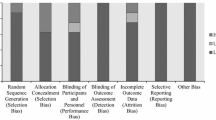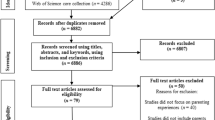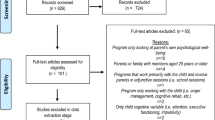Abstract
Purpose
There are well-established risks for parents with severe mental illness (i.e. psychotic and bipolar disorders), both for their children and themselves. Interventions to help parents fulfil their role should therefore be a public health objective, but their implementation needs to be underpinned by research evidence. This systematic review determines what is known about the nature and effectiveness of interventions for parents with severe mental illness.
Methods
We conducted a narrative synthesis of controlled and uncontrolled studies reporting interventions for this patient group after the post-natal period (i.e. after the child has turned 1 year old).
Results
Eighteen publications reported data from 15 studies. All but two studies were rated as low quality studies. Interventions included home visiting programmes, complex community programmes, residential treatments, and online interventions. Interventions targeted diverse areas, with parenting skills and understanding the impact of mental illness on parenting most frequently addressed. Both parent and child-related outcomes improved, but children were only assessed via observers and follow-up times were short.
Conclusions
Interventions were diverse with respect to their nature and effectiveness. Future interventions should combine different intervention strategies to target multiple areas in a flexible manner. The addition of positively focussed and resource-oriented components should be investigated. Trials should include direct assessments of both parents and children, outcomes that are relevant from a public health perspective, and establish the long-term effects ideally until children have reached 18 years of age.

Similar content being viewed by others
References
Henshaw C (2011) Parents as patients: Supporting the needs of patients who are parents and their children. London, Royal College of Psychiatrists CR 164 http://www.sssft.nhs.uk/images/Safeguarding/Patients-as-Parents-CR164-Staff.pdf
Howard LM, Kumar R, Thornicroft G (2001) Psychosocial characteristics and needs of mothers with psychotic disorders. Br J Psychiatry 178:427–432
Campbell L, Hanlon M-C, Poon AWC, Paolini S, Stone M, Galletly C, Stain HJ, Cohen M (2012) The experiences of australian parents with psychosis: the second australian national survey of psychosis. Aust N Z J Psychiatry 46:890–900
Vigod SN, Seeman MV, Ray JG, Anderson GM, Dennis CL, Grigoriadis S, Gruneir A, Kurdyak PA, Rochon PA (2012) Temporal trends in general and age-specific fertility rates among women with schizophrenia (1996–2009): a population-based study in ontario, canada. Schizophr Res 139:169–175
Galbally M, Snellen M, Walker S, Permezel M (2010) Management of antipsychotic and mood stabilizer medication in pregnancy: recommendations for antenatal care. Aust N Z J Psychiatry 44:99–108
Khan R (2012) Morbid obesity in pregnancy: a review. Cur Opin Obstet Gynecol 24:382–386
Leight KL, Fitelson EM, Weston CA, Wisner KL (2010) Childbirth and mental disorders. Int Rev Psychiatry 22:453–471
Massey SH, Compton MT (2013) Psychological differences between smokers who spontaneously quit during pregnancy and those who do not: a review of observational studies and directions for future research. Nicotine Tob Res 15:307–319
Stanley SH, Laugharne JDE (2012) Obesity, cardiovascular disease and type 2 diabetes in people with a mental illness: a need for primary health care. Aust J Prim Health 18:258–264
King-Hele S, Webb RT, Mortensen PB, Appleby L, Pickles A, Abel KM (2009) Risk of stillbirth and neonatal death linked with maternal mental illness: a national cohort study. Arch Dis Child Fetal Neonatal Ed 94:F105–F110
Nilsson E, Hultman CM, Cnattingius S, Olausson PO, Björk C, Lichtenstein P (2008) Schizophrenia and offspring’s risk for adverse pregnancy outcomes and infant death. Br J Psychiatry 193:311–315
Jablensky AV, Morgan V, Zubrick SR, Bower C, Yellachich L-A (2005) Pregnancy, delivery, and neonatal complications in a population cohort of women with schizophrenia and major affective disorders. Am J Psychiatry 162:79–91
Henriksson KM, McNeil TF (2004) Health and development in the first 4 years of life in offspring of women with schizophrenia and affective psychoses: well-baby clinic information. Schizophr Res 70:39–48
Hans SL, Auerbach JG, Styr B, Marcus J (2004) Offspring of parents with schizophrenia: mental disorders during childhood and adolescence. Schizophr Bull 30:303–315
Montgomery P, Brown S, Forchuk C (2011) A comparison of individual and social vulnerabilities, health, and quality of life among canadian women with mental diagnoses and young children. Women’s Health Issues 21:48–56
Lee SJ, Taylor CA, Bellamy JL (2012) Paternal depression and risk for child neglect in father-involved families of young children. Child Abuse Negl 36:461–469
Sands RG, Koppelman N, Solomon P (2004) Maternal custody status and living arrangements of children of women with severe mental illness. Health Soc Work 29:317–325
Grant G, Repper J, Nolan M (2008) Young people supporting parents with mental health problems: experiences of assessment and support. Health Soc Care Community 16:271–281
Terzian A, Andreoli S, Oliveira L, Jesus Mari J, McGrath J (2007) A cross-sectional study to investigate current social adjustment of offspring of patients with schizophrenia. Eur Arch Psychiatry Clin Neurosci 257:230–236
Bassett JL, Lloyd Chris, Hazel (1999) Parenting: Experiences and feelings of parents with a mental illness. J Ment Health 8:597–604
Mowbray CT, Oyserman D, Bybee D (2000) Mothers with serious mental illness. New Dir Ment Health Serv 88:73–91
Seeman MV (2012) Intervention to prevent child custody loss in mothers with schizophrenia. Schizophr Res Treat 2012:796763
Seeman MV (2008) Prevention inherent in services for women with schizophrenia. Can J Psychiatry 2008(53):332–341
Maybery D, Reupert A (2009) Parental mental illness: a review of barriers and issues for working with families and children. J Psychiatr Ment Health Nurs 16:784–791
Blegen NE, Hummelvoll JK, Severinsson E (2010) Mothers with mental health problems: a systematic review. Nurs Health Sci 12:519–528
Klika JB, Herrenkohl TI (2013) A review of developmental research on resilience in maltreated children. Trauma Violence Abuse 14:222–234
Oyserman D, Mowbray CT, Meares PA, Firminger KB (2000) Parenting among mothers with a serious mental illness. Am J Orthopsychiatry 70:296–315
Bee P, Bower P, Byford S, Churchill R, Calam R, Stallard P, Pryjmachuk S, Berzins K, Cary M, Wan M, Abel K (2014) The clinical effectiveness, cost-effectiveness and acceptability of community-based interventions aimed at improving or maintaining quality of life in children of parents with serious mental illness: a systematic review. Health Technol Assess 18:1–250
Krumm S, Becker T, Wiegand-Grefe S (2013) Mental health services for parents affected by mental illness. Curr Opin Psychiatry 26:362–368
Siegenthaler E, Munder T, Egger M (2012) Effect of preventive interventions in mentally ill parents on the mental health of the offspring: systematic review and meta-analysis. J Am Acad Child Adolesc Psychiatry 51:8–17
Fraser C, James EL, Anderson K, Lloyd D, Judd F (2006) Intervention programs for children of parents with a mental illness: a critical review. Int J Ment Health Promot 8:9–20
Sockol LE, Epperson CN, Barber JP (2013) Preventing postpartum depression: a meta-analytic review. Clin Psychol Rev 33:1205–1217
Gearing RE, Alonzo D, Marinelli C (2012) Maternal schizophrenia: psychosocial treatment for mothers and their children. Clin Schizophr Relat Psychoses 6:27–33
Waldo MC, Roath M, Levine W, Freedman R (1987) A model program to teach parenting skills to schizophrenic mothers. Hosp Community Psychiatry 38:1110–1112
Brockington IAN, Chandra P, Dubowitz H, Jones D, Moussa S, Nakku J, Quadros Ferre I (2011) WPA guidance on the protection and promotion of mental health in children of persons with severe mental disorders. World Psychiatry 10:93–102
Seeman MV (2013) Clinical interventions for women with schizophrenia: pregnancy. Acta Psychiatr Scand 127:12–22
Nicholson J, Hinden B, Biebel K, Henry A, Katz-Leavy J (2007) A qualitative study of programs for parents with serious mental illness and their children: building practice-based evidence. J Behav Health Serv Res 34:395–413
David DH, Styron T, Davidson L (2011) Supported parenting to meet the needs and concerns of mothers with severe mental illness. Am J Psychiatr Rehabil 14:137–153
Moher D, Liberati A, Tetzlaff J, Altman DG (2009) Preferred reporting items for systematic reviews and meta-analyses: the PRISMA statement. BMJ 339:b2535
Popay J, Roberts H, Sowden A, Petticrew M, Arai L, Rodgers M (2006) Guidance on the conduct of narrative synthesis in systematic reviews. Version 1: April http://tees.academia.edu/LisaArai/Papers/259152/Guidance_on_the_Conduct_of_Narrative_Synthesis_In_Systematic_Reviews
OvidSP (2014) http://ovidsp.uk.ovid.com
ProQuest (2014) CSA Illumina. http://usage.csa.com/usage/usage.php
EBSCO (2014) CINAHL. http://www.ebscohost.com/
The Cochrane Collaboration (2014) The Cochrane Library. http://www.thecochranelibrary.com/view/0/index.html
Medline (2014) http://www.ncbi.nlm.nih.gov/pubmed
Google Scholar (2014) http://scholar.google.com
Schrank B, Bird V, Rudnick A, Slade M (2012) Determinants, self-management strategies and interventions for hope in people with mental disorders: systematic search and narrative review. Soc Sci Med 74:554–564
Schrank B, Bird V, Tylee A, Coggins T, Rashid T, Slade M (2013) Conceptualising and measuring the well-being of people with psychosis: systematic review and narrative synthesis. Soc Sci Med 92:9–21
EPHPP (1998) Effective public health practice project. Quality assessment tool for quantitative studies. http://www.ephpp.ca/index.html
Juni P, Altman DG, Egger M (2001) Systematic reviews in health care: assessing the quality of controlled clinical trials. BMJ 323:42–46
Braun V, Clarke V (2006) Using thematic analysis in psychology. Qual Res Psychol 3:77–101
Beardslee WR, Hoke L, Wheelock I, Rothberg PC, van de Velde P, Swatling S (1992) Initial findings on preventive intervention for families with parental affective disorders. Am J Psychiatry 149:1335–1340
Beardslee WR, Salt P, Porterfield K, Rothberg PC, van de Velde P, Swatling S, Hoke L, Moilanen DL, Wheelock I (1993) Comparison of preventive interventions for families with parental affective disorder. J Am Acad Child Adolesc Psychiatry 32:254–263
Beardslee WR, Wright E, Rothberg PC, Salt P, Versage E (1996) Response of families to two preventive intervention strategies: long-term differences in behavior and attitude change. J Am Acad Child Adolesc Psychiatry 35:774–782
Phelan R, Lee L, Howe D, Walter G (2006) Parenting and mental illness: a pilot group programme for parents. Australas Psychiatry 14:399–402
Phelan RF, Howe DJ, Cashman EL, Batchelor SH (2012) Enhancing parenting skills for parents with mental illness: the Mental Health Positive Parenting Program. Med J Aust 199:S30–S33
Anonymous (2002) Integrated services for mothers with dual diagnoses and their children. Arkansas Center for Addictions Research, Education, and Services. Psychiatr Serv 53:1311–1313
Brunette MF, Richardson F, White L, Bemis G, Eelkema RE (2004) Integrated family treatment for parents with severe psychiatric disabilities. Psychiatr Rehabil J 28:177–180
Cohler BJ, Grunebaum H (1982) Children of parents hospitalized for mental illness: II. The evaluation of an intervention program for mentally ill mothers of young children. J Child Contemp Society 15:57–66
Crane KD, Totten S (2003) Helping parents with serious mental illness retain custody of their children. Psychiatr Serv 54:1526–1528
Hanrahan P, McCoy ML, Cloninger L, Dincin J, Zeitz MA, Simpatico TA, Luchins DJ (2005) The mothers’ project for homeless mothers with mental illnesses and their children: a pilot study. Psychiatr Rehabil J 28:291–294
Kaplan K, Solomon P, Salzer MS, Brusilovskiy E (2014) Assessing an internet-based parenting intervention for mothers with a serious mental illness: a randomized controlled trial. Psychiatr Rehabil J 37:222–231
Lucas LE, Montgomery SH, Richardson DA, Rivers PA (1984) Impact Project: reducing the risk of mental illness to children of distressed mothers. New Dir Ment Health Serv 24:79–94
Nicholson J, Albert K, Gershenson B, Williams V, Biebel K (2009) Family options for parents with mental illnesses: a developmental, mixed methods pilot study. Psychiatr Rehabil JFall 33:106–114
Croake JW, Kelly FD (1985) Adlerian Family Therapy with schizophrenic and depressed patients. Individ Psychol 41:302–312
van der Zanden RA, Speetjens PA, Arntz KS, Onrust SA (2010) Online group course for parents with mental illness: development and pilot study. J Med Internet Res 12:e50
Rothenburg S, Cranz B, Hartmann HP, Petermann F (2005) Inpatient treatment of mother and child in psychiatry: relevant data of mother and child. Psychiatr Prax 32:23–30
Jones S, Calam R, Sanders M, Diggle PJ, Dempsey R, Sadhnani V (2013) A pilot web based positive parenting intervention to help bipolar parents to improve perceived parenting skills and child outcomes. Behav Cogn Psychother 2:1–14
Huntsman L (2008) Parents with mental health issues consequences for children and effectiveness of interventions designed to assist children and their families. http://www.community.nsw.gov.au/docswr/_assets/main/documents/research_parentalmentalhealth.pdf
Goodson BD, Mackrain M, Perry DF, O’Brien K, Gwaltney MK (2013) Enhancing home visiting with mental health consultation. Pediatrics 132:S180–S190
Avellar SA, Supplee LH (2013) Effectiveness of home visiting in improving child health and reducing child maltreatment. Pediatrics 132:S90–S99
Peacock S, Konrad S, Watson E, Nickel D, Muhajarine N (2013) Effectiveness of home visiting programs on child outcomes: a systematic review. BMC Public Health 13:17
Dennis CL (2014) Psychosocial interventions for the treatment of perinatal depression. Best Pract Res Clin Obstet Gynaecol 28:97–111
Brunette M, Dean W (2002) Community mental health care for women with severe mental illness who are parents. Community Ment Health J 38:153–165
Jackson V (2004) Residential treatment for parents and their children: the village experience. Sci Pract Perspect 2:44–53
Niela-Vilén H, Axelin A, Salanterä S, Melender H-L (2014) Internet-based peer support for parents: a systematic integrative review. Int J Nurs Stud 51:1524–1537
Schrank B, Sibitz I, Unger A, Amering M (2010) How patients With schizophrenia use the internet: qualitative study. J Med Internet Res 12:e70
Thomson S, Michelson D, Day C (2015) From parent to ‘peer facilitator’: a qualitative study of a peer-led parenting programme. Child Care Health Dev 41:76–83
Michelson D, Ben-Zion I, James AI, Draper L, Penney C, Day C (2014) ‘Living with Teenagers’: feasibility study of a peer-led parenting intervention for socially disadvantaged families with adolescent children. Arch Dis Child 99:731–737
Nieuwboer CC, Fukkink RG, Hermanns JM (2013) Peer and professional parenting support on the Internet: a systematic review. Cyberpsychol 16:518–528
Reupert A, Maybery D (2007) Families affected by parental mental illness: a multiperspective account of issues and interventions. Am J Orthopsychiatry 77:362–369
Ackerson BJ (2003) Parents with serious and persistent mental illness: issues in assessment and services. Soc Work 48:187–194
Ackerson BJ (2003) Coping with the dual demands of severe mental illness and parenting: the parents’ perspective. Fam Soc 84:109–118
Sanders MR, Kirby JN, Tellegen CL, Day JJ (2014) The Triple P-Positive Parenting Program: a systematic review and meta-analysis of a multi-level system of parenting support. Clin Psychol Rev 34:337–357
Wilson P, Rush R, Hussey S, Puckering C, Sim F, Allely CS, Doku P, McConnachie A, Gillberg C (2012) How evidence-based is an ‘evidence-based parenting program?’ A PRISMA systematic review and meta-analysis of Triple P. BMC Med 10:130
Herjanic B, Herjanic M, Brown F, Wheatt T (1975) Are children reliable reporters? J Abnorm Child Psychol 3:41–48
United Nations General Assembly (1989) Convention on the Rights of the Child, 20 November 1989. Ann Rev Popul Law 16:485–501
Metzler CW, Sanders MR, Rusby JC, Crowley RN (2012) Using consumer preference information to increase the reach and impact of media-based parenting interventions in a public health approach to parenting support. Behav Therap 43:257–270
Hartmann H-P (1997) Mutter-Kind-Behandlung in der Psychiatrie. Teil II: Eigene Erfahrungen-Behandlungskonzepte und besondere Probleme. Psychiatrische Praxis 24:172–177
Conflict of interest
On behalf of all authors, the corresponding author states that there is no conflict of interest.
Author information
Authors and Affiliations
Corresponding author
Electronic supplementary material
Below is the link to the electronic supplementary material.
Rights and permissions
About this article
Cite this article
Schrank, B., Moran, K., Borghi, C. et al. How to support patients with severe mental illness in their parenting role with children aged over 1 year? A systematic review of interventions. Soc Psychiatry Psychiatr Epidemiol 50, 1765–1783 (2015). https://doi.org/10.1007/s00127-015-1069-3
Received:
Accepted:
Published:
Issue Date:
DOI: https://doi.org/10.1007/s00127-015-1069-3




